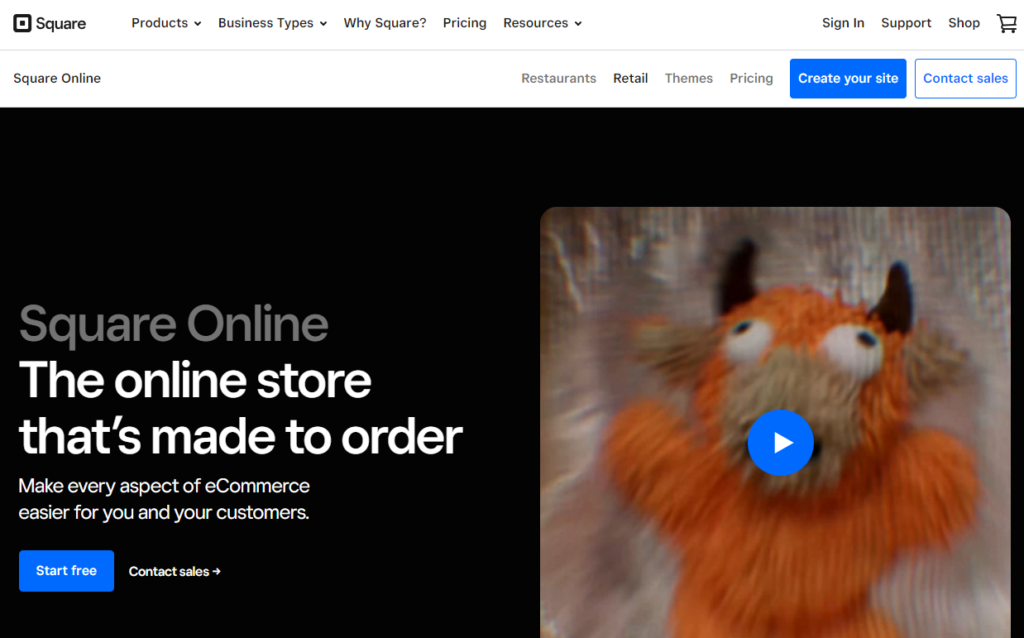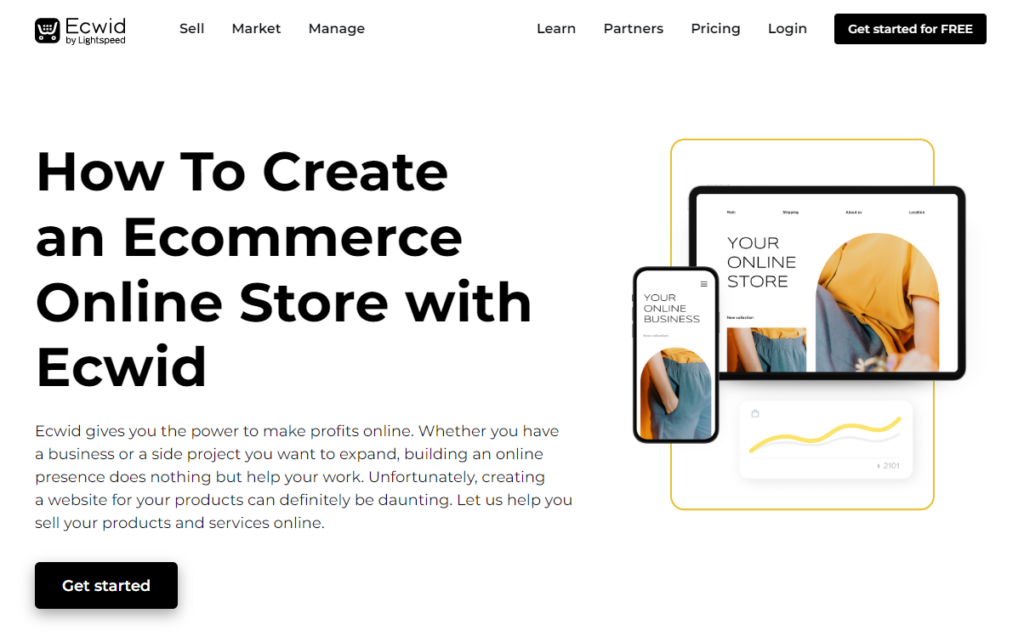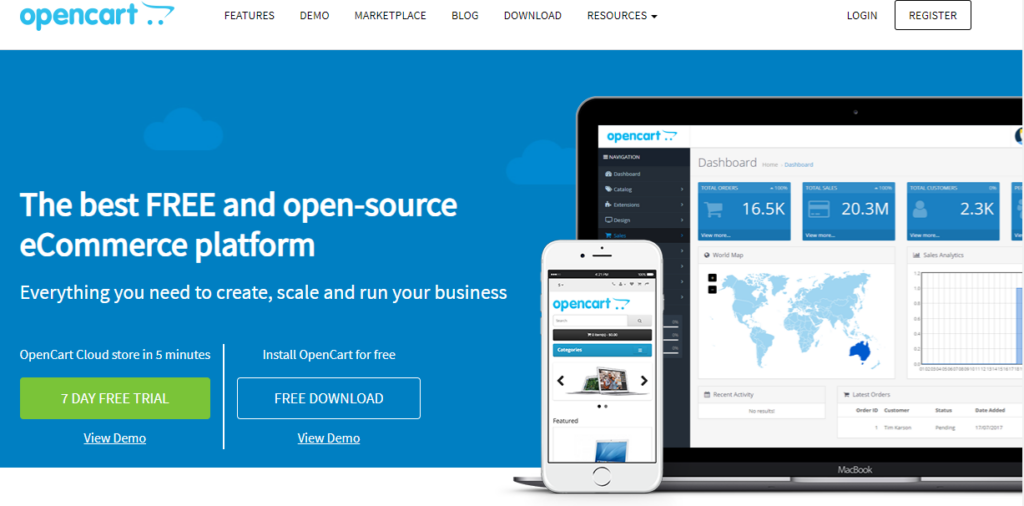Shopify is a leading e-commerce platform that empowers businesses of all sizes to build, manage, and grow their online stores.
Whether you’re a seasoned entrepreneur or just starting your first online venture, Shopify offers a comprehensive solution to help you thrive in the digital marketplace.
Here’s a quick overview of what Shopify offers:
Building your store:
- Drag-and-drop store builder: No coding required! Create a beautiful and professional online store with ease, even if you have no technical experience.
- Theme store: Choose from a wide variety of customizable themes to match your brand and style.
- App store: Extend your store’s functionality with thousands of apps for marketing, payments, shipping, analytics, and more.
Managing your business:
- Product listings: Add, edit, and manage your products with ease.
- Inventory management: Track your stock levels and avoid overselling.
- Payments processing: Accept payments securely through various payment gateways.
- Shipping and fulfillment: Set up shipping options and manage fulfillment with built-in tools or integrate with third-party services.
- Marketing tools: Run email campaigns, create discount codes, and promote your store on social media.
- Analytics: Track your store’s performance and gain valuable insights to make informed decisions.
Growing your store:
- SEO tools: Optimize your store for search engines to attract organic traffic.
- Mobile commerce: Ensure your store looks and functions flawlessly on all devices.
- Multi-channel selling: Sell your products on multiple channels like Facebook, Instagram, and Amazon.
- Global reach: Sell to customers worldwide with built-in support for multiple languages and currencies.
Shopify Pros and Cons
Before we look at free Shopify alternatives in the UK, let’s talk about its pros and cons.
Pros:
- Ease of use: Shopify is known for its user-friendly interface and beginner-friendly setup. Even people with no coding experience can launch their online store quickly.
- Scalability: Shopify offers different plans to cater to businesses of all sizes, from startups to large enterprises. You can easily upgrade your plan as your business grows.
- Wide range of features: Shopify comes with a built-in set of features for managing your store, including product listings, inventory management, payments processing, marketing tools, and analytics.
- App store: The Shopify App Store offers a vast selection of apps to extend your store’s functionality with features like abandoned cart recovery, loyalty programs, and social media marketing.
- Reliable hosting and security: Shopify takes care of hosting and security, so you don’t have to worry about server maintenance or data breaches.
- Mobile-friendly themes: All Shopify themes are responsive and designed to look good on any device, ensuring a seamless shopping experience for your customers.
- SEO tools: Shopify provides essential SEO tools to help you optimize your store for search engines and improve your organic traffic.
Cons:
- Transaction fees: Shopify charges transaction fees on all sales, which can eat into your profits, especially for high-volume businesses.
- Limited design customization: While Shopify offers a variety of themes, the ability to deeply customize the look and feel of your store is restricted compared to some platforms.
- App costs: Many useful apps in the Shopify App Store require additional monthly fees, which can add up over time.
- Not ideal for very complex stores: If you need a highly customized store with unique features, Shopify might not be the best option.
- No email hosting: Shopify doesn’t offer email hosting, so you’ll need to use a separate provider for your business email.
Overall:
Shopify is a powerful and user-friendly eCommerce platform that’s a great choice for many businesses.
Is there a free version for Shopify?
Shopify doesn’t have a permanent free version, but it does offer a 14-day free trial. This trial allows you to explore the platform, build your store, add products, and even process a few test orders (although these won’t be fulfilled). However, to actually accept live payments and run your store publicly, you’ll need to subscribe to a paid plan.
Here’s a quick breakdown:
Free Trial:
- Lasts for 14 days
- Full access to Shopify features
- No credit card required
- Can’t accept live payments
- Store remains password-protected
Paid Plans:
- Start at $29/month (Basic Shopify)
- Offer different features and capabilities based on your needs
- Allow you to accept live payments and run your store publicly
If you’re just starting out and experimenting with the idea of opening an online store, the free trial can be a valuable tool to assess Shopify’s suitability. However, keep in mind that you’ll eventually need to switch to a paid plan to operate your store for real.
Here are some alternatives to consider if you’re looking for a completely free platform.
Top 7 Free Shopify Alternatives in the UK
Yes, Shopify is a popular eCommerce platform here in the UK, but it isn’t the only option available.
So, if you’re looking for a free Shopify alternative in the UK, here are 7 of the best:
Wix Ecommerce

Wix offers a free plan that includes an online store with basic features like product listings, a shopping cart, and payments processing. You can also upgrade to a paid plan for more features like abandoned cart recovery and subscriptions.
Pros:
- User-friendly platform that is easy to use, even for web design novices
- Offers a lot of opportunities for customization
- Provides a wide range of templates
- Provides a range of selling features at an affordable price
- Has a free plan and budget-friendly prices for those just starting out
- Offers a great range of ecommerce tools
Cons:
- Lack of flexibility
- Websites aren’t transferrable
- No external third-party apps or plugins
- Limited monetization options
- Templates are not interchangeable
- Free plan forces Wix branding
- Tracking and analytics require a paid plan
- Premium plans are single-site only
- Websites created on Wix may have a slimmer chance of being ranked higher on Google
Square Online

Square Online is another free option that’s easy to use and includes features like inventory management and customer profiles. You can also upgrade to a paid plan for more features like shipping discounts and real-time inventory tracking.
Pros:
- Square Online is easy to set up and use, making it a good option for small business owners looking to establish an online presence.
- It integrates well with the Square Retail POS, making inventory management and other Square features easily accessible.
- Offers a free plan with features such as POS, inventory management, and the ability to accept online payments.
- The platform offers free in-house delivery on certain plans, real-time shipping cost estimates, and premium support.
- Phone support is available across all plans, including the free one, with extended hours on weekends.
Cons:
- There is a limited scope for customization, which may not be suitable for those requiring deep customization options.
- To avoid larger transaction fees, users are required to use the Square payment gateway.
- It lacks some advanced features such as advanced shipping and inventory management, which may not be suitable for high-volume ecommerce businesses
Ecwid

Ecwid is a free Shopify alternative in the UK. Lets you add an online store to your existing website or social media page.
You can also upgrade to a paid plan for more features like product variants and abandoned cart emails.
Pros:
- Ecwid does not charge additional transaction fees, even on its free plan, making it a cost-effective option for small businesses.
- It offers a free plan with no transaction fees and allows for up to ten products, making it suitable for those just starting out.
- All paid plans allow multichannel selling and inventory management across different sales channels, ensuring automatic inventory adjustments.
- Ecwid integrates with existing sites using HTML and provides some level of customization, making it easy to add e-commerce features to an existing website.
Cons:
- Some users have reported that the platform’s customization and styling options are basic and may not be sufficient for those requiring extensive customization.
- Phone support is only available on the more expensive plans, which may be a drawback for users on lower-tier plans.
- There is room for improvement in terms of SEO features, which may impact the discoverability of Ecwid stores on search engines
WooCommerce

WooCommerce is a free open-source plugin that turns your WordPress website into an online store.
And a perfect free Shopify alternative in the UK.
Pros:
- Free and Open-Source: WooCommerce is free to use and open-source, making it a cost-effective option for small businesses.
- Flexibility and Customization: It is highly customizable and flexible, allowing users to sell a wide variety of products and services.
- Large Community and Extensions: It has a large community of users and numerous extensions to enhance the look and functionality of the platform.
- Integration with WordPress: It integrates well with WordPress, making it easy to add e-commerce functionality to an existing WordPress site.
- Multichannel Selling and Inventory Management: It offers multichannel selling and inventory management across different sales channels, ensuring automatic inventory adjustments.
Cons:
- WordPress-Reliant: WooCommerce is a WordPress plugin and is not an independent e-commerce platform, which means it cannot be used on sites that WordPress doesn’t host.
- Limited Scalability: It may not be suitable for larger businesses as it is best suited for small to medium-sized businesses.
- SEO Limitations: Some of the back-end components of WooCommerce may impact SEO negatively from a technical standpoint.
- Limited Support: Phone support is only available on the more expensive plans, which may be a drawback for users on lower-tier plans
PrestaShop

PrestaShop is another free open-source eCommerce platform that’s popular in Europe.
Pros:
- Tailored for E-commerce: PrestaShop is specifically tailored for e-commerce, focusing on the shop, products, and payment/shipment options.
- Ongoing Development: The platform undergoes ongoing development, with new versions offering new features, improvements, and security updates.
- Free and Open-Source: PrestaShop is 100% free and open-source, making it a cost-effective option for building online stores.
- Highly Customizable: It is highly customizable, allowing for the creation of fully customizable online shops.
- Multilingual and Multicurrency Support: PrestaShop supports multiple languages and currencies, facilitating internationalization.
Cons:
- Steep Learning Curve: The platform has a steep learning curve, which may require help from experts.
- Limited Free Options: There are few free options available for themes, functionalities, and other add-ons, which may increase the cost of setting up a store.
- Responsibilities for the Seller: Using PrestaShop may entail more responsibilities for the seller, possibly related to the need for expert assistance and the limited free options
OpenCart

OpenCart is a free open-source eCommerce platform that’s been around for over a decade.
Pros:
- Open-Source and Free to Use: OpenCart is open-source and free, making it a cost-effective option for setting up online stores.
- User-Friendly: It has a visually appealing interface and is designed to be easy to use and develop with PHP.
- Customization and Features: It offers a good basic set of features for quick setup and provides hundreds of modules for additional features, with support for unlimited categories, products, multiple currencies, and languages.
- SEO-Friendly: OpenCart is search engine friendly, which can be beneficial for online visibility.
Cons:
- Limited Scalability: Some users have noted that the platform’s basic features may limit scalability and growth ambitions.
- Limited Support for Large Sites: It may not be suitable for large sites with extensive inventory due to its lightweight nature.
- Customization Challenges: While it offers customization, some users have mentioned limitations in template support and plugin options compared to competitors
Magento (Now Adobe Commerce)

Magento is a powerful open-source eCommerce platform that’s used by some of the world’s largest brands. It’s free to download and use, but it requires a lot of technical expertise to set up and maintain.
Pros:
- High Flexibility and Customization: Magento offers a flexible and customizable end-to-end e-commerce solution, allowing merchants to get customized site functions.
- Built-in Features and Functionality: It provides a good basic set of features for quick setup and offers hundreds of modules for additional features, with support for unlimited categories, products, multiple currencies, and languages.
- SEO-Friendly: Magento is search engine friendly, which can be beneficial for online visibility.
- Scalability: Magento can manage scalability with ease, unlike some e-commerce web apps that struggle under load and may impede growth.
Cons:
- High Development Cost: Magento’s development cost is high, making it a more expensive option compared to SaaS platforms like Shopify or BigCommerce.
- Maintenance and Plugin Costs: Maintenance costs for a Magento site are not insignificant, and all that customizability and functionality has a price.
- Technical Resources and Time: Magento demands a lot of technical resources and time, which can be a drawback for small businesses.
- Hosting Requirements: Magento requires hosting, which is an additional cost that needs to be taken into account
The best free Shopify alternative in the UK for you will depend on your specific needs and budget.
If you’re just starting out, a free plan like Wix Ecommerce or Square Online might be a good option.
If you need more features, you can upgrade to a paid plan or consider a more complex platform like WooCommerce or Magento.
Factors to consider when choosing a Shopify alternative in the UK
Choosing the right e-commerce platform is crucial for any online business, and while Shopify is popular, it’s not the only option.
Many free Shopify alternatives in the UK offer diverse feature sets and cater to specific needs.
Here are some key factors to consider when exploring Shopify alternatives:
1. Your Business Needs and Goals:
- Industry and Products: Analyze your industry’s common platform choices and the specific features needed to sell your products effectively. For example, a digital product store might prioritize download management, while a clothing store might require robust size and variant options.
- Business Size and Stage: Are you a startup needing a simple platform or a larger business requiring advanced features and scalability? Consider your growth potential and future needs.
- Technical Expertise: Do you have developers on hand, or do you need a user-friendly platform with minimal coding requirements?
2. Essential Features and Functionalities:
- Product Management: Consider the product complexity, variant options, inventory management needs, and digital download capabilities.
- Marketing and Sales Tools: Evaluate built-in marketing features like email marketing, SEO tools, and discount codes, along with integrations with external marketing platforms.
- Payment Processing: Understand the supported payment gateways, transaction fees, and security measures offered by each platform.
- Shipping and Fulfillment: Assess built-in shipping options, integration with fulfillment services, and international shipping capabilities.
- Design and Customization: How important is the ability to customize the look and feel of your store to match your brand?
3. Cost and Pricing:
- Platform Fees: Compare monthly subscription fees, transaction fees, and any additional costs associated with apps or integrations.
- Hidden Costs: Be aware of potential charges for bandwidth, storage, or third-party services needed for specific features.
- Scalability: Choose a platform that aligns with your growth plans and doesn’t require expensive migrations as your business scales.
4. Ease of Use and Support:
- User Interface: Evaluate how intuitive and user-friendly the platform’s interface is for managing your store, especially if you have limited technical expertise.
- Community and Support: Consider the availability of documentation, tutorials, forums, and live support offered by the platform and its community.
5. Additional Considerations:
- Security and Data Privacy: Ensure the platform adheres to industry security standards and offers data privacy features to protect your customer information.
- Mobile Commerce: With the growing importance of mobile shopping, prioritize a platform offering a responsive or dedicated mobile app for your store.
- Integrations: Evaluate available integrations with your existing business tools and preferred marketing platforms.
Read also: